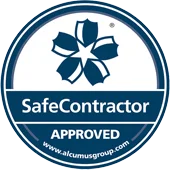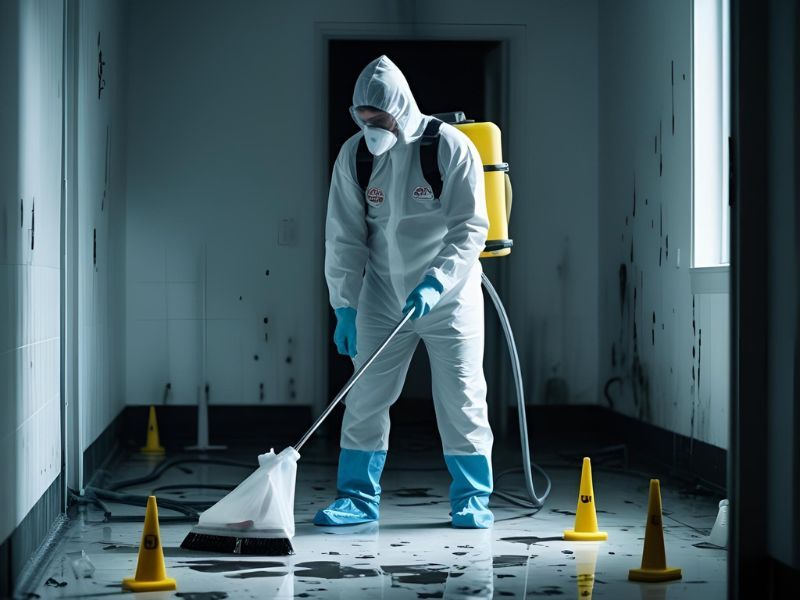
When a crime occurs at your property, the emotional trauma is overwhelming enough without having to worry about the aftermath. Many people wonder who is responsible for cleaning up after a criminal investigation concludes. The reality might surprise you: police and law enforcement officers do not clean up crime scenes. This responsibility falls to specialized professionals who have the training, equipment, and certification to safely restore properties to their original condition.
Law enforcement officers have a specific role when a crime takes place. Their primary focus involves securing the scene, collecting evidence, documenting everything that happened, and conducting their investigation. Once the police complete their work and the scene is released, their involvement ends. Officers are not equipped with the specialized training or professional equipment needed to clean biological materials or handle the complex process of biohazard cleaning.
The police investigation can take anywhere from several hours to multiple days, depending on the severity of the crime. During this time, family members and property owners must wait before any cleaning can begin. Law enforcement must ensure they run tests on all potential evidence before releasing the scene to the rightful owners.
Crime scene cleanup involves much more than regular cleaning. When a traumatic event occurs, it often leaves behind bodily fluids, blood, and other potentially dangerous materials that pose serious health risks. These biological materials can contain bloodborne pathogens such as HIV, hepatitis B, and other dangerous pathogens that require specialized handling.
The global biohazard cleanup market, which includes crime scene cleaning, is projected to exceed £1.2 billion by 2030, driven by growing awareness, stricter regulations, and increasing urban crime rates. This growth reflects the increasing recognition that professional intervention is essential for these situations.
Professional crime scene cleaners use personal protective equipment and follow strict safety procedures to ensure complete decontamination. The process requires deep clean techniques that go far beyond what most people can accomplish with household cleaning supplies. Trauma scene cleanup demands specialized training in handling hazardous materials and understanding which surfaces need treatment.

Crime scene cleaners are the professionals who handle this challenging job. These specialized companies employ trauma cleaners who have received certification programs and possess the specialist knowledge needed to safely restore properties. Professional companies that deal with bioremediation have invested in professional equipment designed specifically for this type of work. If you’ve ever wondered who cleans up after a death in North West UK, these are the trained experts who quietly step in during some of life’s most difficult moments.
Unlike regular cleaning companies, forensic cleaners understand the unique challenges that crime scenes present. They know how to properly dispose of contaminated materials and which broad spectrum disinfectant products work most effectively. The process involves multiple steps, including initial assessment, removal of contaminated materials, thorough cleaning with specialized chemicals, and final disinfectant soak procedures.
Most crime scene cleaning companies operate 24/7 because traumatic events don't follow regular business hours. Many cleaning jobs actually happen after dark or in the early morning hours to preserve privacy and limit public exposure for grieving families. These professionals understand that family members need immediate help during an emergency response situation. The job requires not only technical skills but also compassion for those dealing with trauma.
Contrary to what crime dramas portray on television, real crime scene cleaning involves hours or days of meticulous disinfection, personal protective equipment use, and careful waste handling. It's far from the quick cleanup shown in popular media.
Professional crime scene cleanup follows a systematic approach that ensures safety and thoroughness. The process begins when crime scene cleaners arrive at the property wearing full personal protective equipment. They first assess the extent of contamination and develop a plan for complete restoration.
The cleaning process involves several stages. First, professionals remove all visible biological materials and dispose of them according to strict regulations. Next, they apply specialized cleaning agents that break down proteins and other organic matter. The deep clean process continues with multiple applications of disinfectants designed to eliminate any remaining pathogens.
After the initial cleaning, trauma cleaners conduct thorough inspections to ensure no contaminated areas remain. They use specialized equipment to detect traces of biological materials that might not be visible to the naked eye. The final step involves air quality testing to confirm the space is safe for reoccupation.
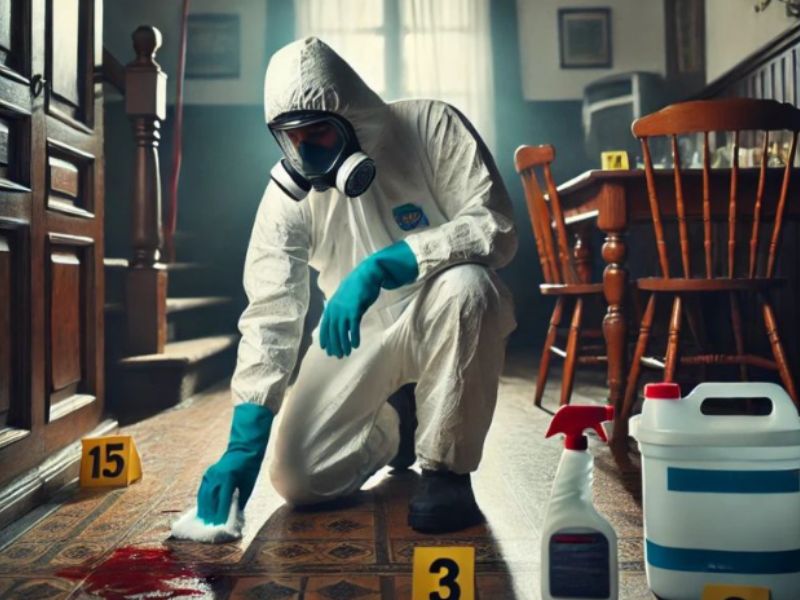
The health risks associated with crime scene cleanup cannot be overstated. Blood and other bodily fluids can harbor numerous bloodborne pathogens that pose serious health risks to anyone exposed without proper protection. These dangerous pathogens can survive on surfaces for extended periods, making professional intervention essential.
Most people lack the specialized training needed to safely handle contaminated materials. Even minor exposure to these substances can result in serious illness or infection. Professional cleaners understand these health and safety requirements and follow strict protocols to protect themselves and others.
The risk extends beyond immediate health concerns. Improper cleaning can leave traces of biological materials that continue to pose health risks long after the initial incident. Only professional crime scene cleaners have the knowledge and equipment necessary to ensure complete decontamination.
Crime scenes vary greatly in scope and complexity. Violent crimes often leave behind significant amounts of blood and tissue that require extensive cleanup. Property owners may need professional help after incidents involving weapons, assault, or other violent encounters where bodily fluids are present.
However, crime scene cleanup extends beyond traditional crimes. Over 70% of biohazard cleaning jobs actually come from unattended deaths, where the body isn't discovered for days or weeks, creating serious decomposition hazards. These situations often involve complex biological contamination that poses significant health risks, raising urgent questions like how to clean up after an unattended death in North West UK.
The work also includes industrial accidents, hoarding cleanups, and methamphetamine laboratory decontamination. Each situation requires specific expertise and equipment to handle the unique challenges involved.
Suicide cleanup represents another significant area where professional crime scene cleaners provide essential services. These scenes account for 25 to 35% of all crime scene cleaning jobs in the UK and require not only technical expertise but also psychological sensitivity when working with affected families. Family members should never attempt to handle this type of cleanup themselves due to both the emotional trauma and health risks involved.
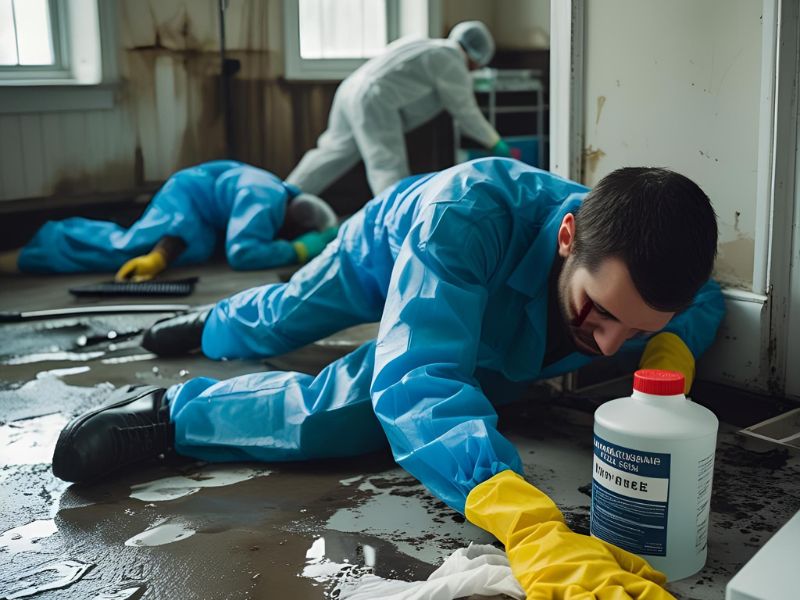
Property owners bear legal responsibility for ensuring their properties are safely restored after a crime takes place. In the UK, biohazard waste must be transported by a licensed carrier and disposed of at authorised facilities, in compliance with the Environmental Protection Act 1990 and The Hazardous Waste Regulations 2005. Failing to properly clean contaminated areas can result in liability issues if others are exposed to dangerous pathogens.
Professional cleaning companies carry insurance and certifications that protect property owners from these risks. There's no single UK-wide licence to become a crime scene cleaner, but reputable professionals receive training in biohazard handling, infection control including bloodborne pathogen training, and Health & Safety regulations including HSE and COSHH compliance.
Insurance coverage for crime scene cleanup varies depending on your policy. Many homeowner's and commercial property insurance policies include coverage for this type of specialized cleaning. Business owners should review their policies to understand what protection they have in place.
The legal requirements for proper disposal of contaminated materials are strict and complex. Professional companies understand these regulations and ensure all waste is handled according to local and federal guidelines. Attempting to handle this yourself could result in legal violations.
The trauma cleaners who work in this field understand that they're helping people during some of the most difficult moments of their lives. Professional companies train their staff to be compassionate and respectful while working in these sensitive situations. They recognize that family members are dealing with emotional trauma while trying to make practical decisions.
Crime scene cleaners are often called the "last responders," dealing with what emergency services leave behind. The work is more about compassion than crime, as cleaners frequently support grieving families through one of their most traumatic experiences. Many describe their work as a form of public service, helping restore dignity to places affected by tragedy.
However, this emotional burden takes its toll. Up to 40% of crime scene cleaners report signs of PTSD or emotional trauma, despite rigorous training. Recognising this challenge, many professional companies now offer mental health support as standard for their employees.
Many crime scene cleaning companies work closely with victim support services and can provide referrals to counselling services. They understand that the traumatic event affects not just the immediate area but the entire family or business. This support extends beyond the physical cleaning to help people begin the healing process.
The costs associated with professional crime scene cleanup vary depending on the extent of contamination and the time required for complete restoration. A typical crime scene cleanup in the UK can cost anywhere between £1,000 and £10,000, depending on the severity, materials involved, and location. For those wondering how much does trauma cleaning cost in North West UK, costs increase significantly with hoarding situations, decomposition cases, or large blood spills.
Several factors influence pricing, including the size of the affected area, the type of materials involved, and the complexity of the cleaning process required. The specialised equipment and extensive safety procedures required for proper decontamination contribute to these costs.
Most cleaning companies provide free estimates and work directly with insurance providers when coverage is available. They understand that families and business owners are dealing with unexpected trauma and try to minimise the financial burden during this difficult time. Payment plans may be available for those who need them.
When compared to the potential health risks and legal liability of improper cleanup, professional services represent a wise investment. The specialised equipment and training required for this job make it impossible for most people to handle safely on their own.

Selecting the right professional crime scene cleaning company requires careful consideration of several factors. Look for companies that employ certified trauma cleaners with proper training and experience. Verify that they carry appropriate insurance and licenses required in your area.
Emergency response time is crucial when dealing with crime scene cleanup. The longer biological materials remain untreated, the greater the health risks and potential for permanent damage. Choose a company that offers 24/7 availability and can respond quickly to your needs.
Check references and reviews from previous clients when possible. Professional companies should be willing to provide information about their training, certifications, and experience. They should also explain their process clearly and answer all your questions before beginning work.
While we cannot predict when traumatic events will occur, property owners can take steps to prepare for these situations. Business owners should include crime scene cleanup in their emergency planning and ensure their insurance policies provide adequate coverage.
Knowing which professional companies serve your area before you need them can save valuable time during a crisis. Keep contact information for reputable trauma cleaners easily accessible. This preparation helps ensure you can respond quickly when emergency response is needed.
Regular training for employees about emergency procedures can help minimize confusion if a traumatic event occurs at your business. While we hope these situations never arise, being prepared helps protect both your property and the people who use it.
Professional crime scene cleaners use advanced technology and specialised equipment that goes far beyond standard cleaning supplies. This includes industrial-grade air filtration systems, specialised chemical agents, and detection equipment that can identify traces of biological materials invisible to the naked eye.
One persistent challenge in crime scene cleanup is odour control. The smell from a decomposing body or blood spill can linger for weeks, even after visible cleanup is complete. Professional companies use ozone generators and enzyme treatments to neutralise these persistent odours that regular cleaning cannot eliminate.
The professional equipment used in crime scene cleanup includes protective suits, respiratory protection, and specialised tools for safely removing contaminated materials. These tools are specifically designed for handling dangerous pathogens and ensuring worker safety during the cleaning process.
Modern cleaning techniques continue to evolve as new technologies become available. Professional companies invest in the latest equipment and training to ensure they can handle any situation safely and effectively. This ongoing investment in technology helps improve outcomes for property owners dealing with these difficult situations.
The crime scene cleanup industry continues to evolve as new challenges emerge and technology advances. Professional companies are constantly updating their training programs and equipment to meet changing needs. This includes staying current with new regulations and safety standards.
Research into new cleaning methods and chemical agents continues to improve the effectiveness of crime scene cleanup. These advances help reduce cleanup time while improving safety for both workers and property owners. The industry focus remains on providing compassionate, professional service during difficult times.
As awareness of the need for professional crime scene cleanup grows, more resources become available to help property owners during these situations. This includes better insurance coverage options and more companies entering the field to provide these essential services.
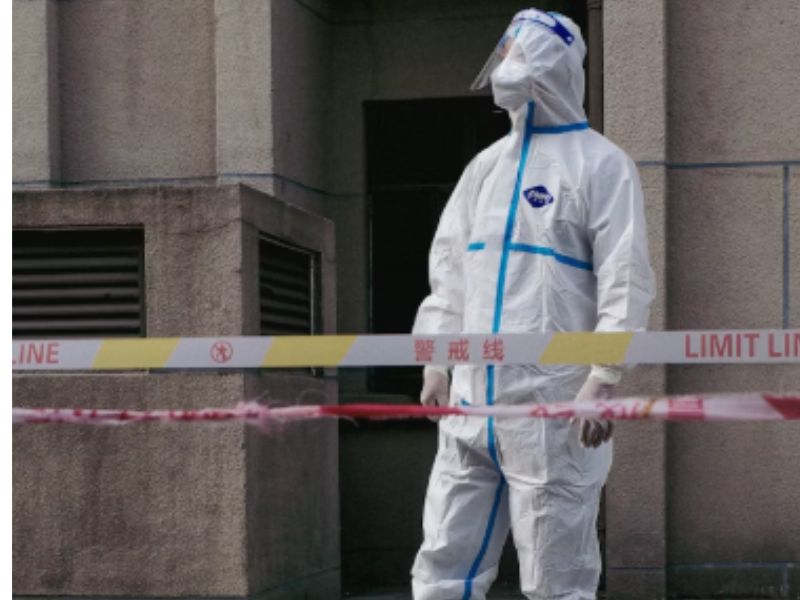
If you find yourself dealing with a crime scene at your property, remember that you don't have to handle this alone. Professional crime scene cleaners have the training, equipment, and experience necessary to safely restore your property while treating your situation with the compassion and respect you deserve.
Don't risk your health or that of your family members by attempting to clean up biological materials yourself. The serious health risks involved require professional intervention from certified trauma cleaners who understand how to safely handle these dangerous situations.
Contact North West Clean Team today for a free quote on professional crime scene cleanup services. Our experienced team is available 24/7 to help restore your property safely and professionally during this difficult time.

